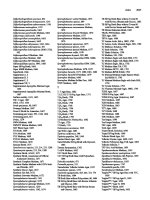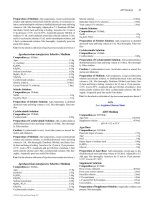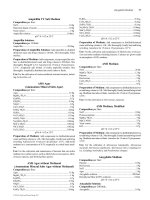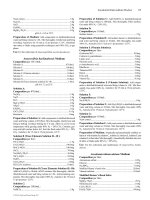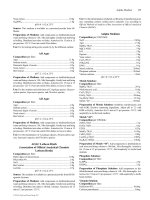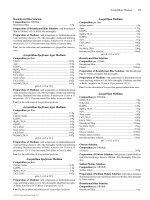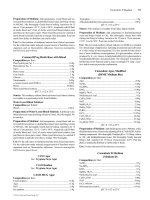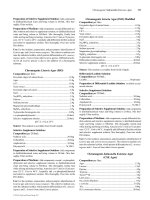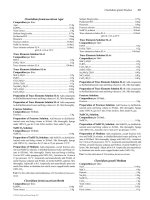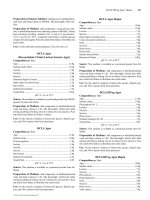Handbook of Microbiological Media, Fourth Edition part 11 doc
Bạn đang xem bản rút gọn của tài liệu. Xem và tải ngay bản đầy đủ của tài liệu tại đây (216.7 KB, 10 trang )
Amygdalin Medium 95
Ampicillin TY Salt Medium
Composition per liter:
NaCl 10.0g
Pancreatic digest of casein 10.0g
Yeast extract 5.0g
Ampicillin solution 10.0mL
pH 7.0 ± 0.2 at 25°C
Ampicillin Solution:
Composition
per 10.0mL:
Ampicillin 50.0mg
Preparation of Ampicillin Solution: Add ampicillin to distilled/
deionized water and bring volume to 10.0mL. Mix thoroughly. Filter
sterilize.
Preparation of Medium: Add components, except ampicillin solu-
tion, to distilled/deionized water and bring volume to 990.0mL. Mix
thoroughly. Bring pH to 7.0. Autoclave for 15 min at 15 psi pressure–
121°C. Aseptically add 10.0mL of sterile ampicillin solution. Mix
thoroughly. Aseptically distribute into sterile tubes or flasks.
Use: For the cultivation of various antibiotic resistant bacteria, includ-
ing Escherichia coli.
AMS Agar
(Ammonium Mineral Salts Agar)
Composition per liter:
Agar 15.0g
MgSO
4
·7H
2
O 1.0g
K
2
HPO
4
0.7g
KH
2
PO
4
0.54g
NH
4
Cl 0.5g
CaCl
2
·2H
2
O 0.2g
FeSO
4
·7H
2
O 4.0mg
H
3
BO
4
0.3mg
CoCl
2
·6H
2
O 0.2mg
ZnSO
4
·7H
2
O 0.1mg
Na
2
MoO
4
·2H
2
O 0.06mg
MnCl
2
·4H
2
O 0.03mg
NiCl
2
·6H
2
O 0.02mg
CuCl
2
·2H
2
O 0.01mg
pH 6.8 ± 0.2 at 25°C
Preparation of Medium: Add components to distilled/deionized
water and bring volume to 1.0L. Mix thoroughly. Gently heat and bring
to boiling. Autoclave for 15 min at 15 psi pressure–121°C. Add sterile
methanol to a concentration of 0.5% aseptically to cooled basal medi-
um.
Use: For the cultivation and maintenance of bacteria that can utilize
methanol as a carbon source, such as Methylobacterium species, Meth-
ylomonas species, and Methylophilus species.
AMS Agar without Methanol
(Ammonium Mineral Salts Agar without Methanol)
Composition per liter:
Agar 15.0g
MgSO
4
·7H
2
O 1.0g
K
2
HPO
4
0.7g
KH
2
PO
4
0.54g
NH
4
Cl 0.5g
CaCl
2
·2H
2
O 0.2g
FeSO
4
·7H
2
O 4.0mg
H
3
BO
4
0.3mg
CoCl
2
·6H
2
O 0.2mg
ZnSO
4
·7H
2
O 0.1mg
Na
2
MoO
4
·2H
2
O 0.06mg
MnCl
2
·4H
2
O 0.03mg
NiCl
2
·6H
2
O 0.02mg
CuCl
2
·2H
2
O 0.01mg
pH 6.8 ± 0.2 at 25°C
Preparation of Medium: Add components to distilled/deionized
water and bring volume to 1.0L. Mix thoroughly. Gently heat and bring
to boiling. Autoclave for 15 min at 15 psi pressure–121°C.
Use: For the cultivation and maintenance of Methylosinus trichospo-
rium and other methane-oxidizing bacteria. Cultures are grown under
an atmosphere of 50% methane.
AMS Medium
Composition per liter:
NaCl 26.0g
MgSO
4
·7H
2
O 12.0g
Peptone 5.0g
Beef extract 3.0g
CaCl
2
·2H
2
O 1.5g
KCl 0.7g
Preparation of Medium: Add components to distilled/deionized wa-
ter and bring volume to 1.0L. Mix thoroughly. Gently heat and bring to boil-
ing. Distribute into tubes or flasks. Autoclave for 15 min at 15 psi pressure–
121°C.
Use: For the cultivation of Alteromonas espejiana.
AMS Medium, Modified
Composition per liter:
NaCl 24.0g
Proteose peptone 10.0g
MgSO
4
·7H
2
O 7.0g
MgCl
2
·6H
2
O 5.3g
Yeast extract 3.0g
KCl 0.7g
pH 7.0 ± 0.2 at 25°C
Preparation of Medium: Add components to distilled/deionized wa-
ter and bring volume to 1.0L. Mix thoroughly. Gently heat and bring to boil-
ing. Distribute into tubes or flasks. Autoclave for 15 min at 15 psi pressure–
121°C.
Use: For the cultivation of Alteromonas haloplanktis, Alteromonas
macleodii, Alteromonas nigrifaciens, Alteromonas rubra, Cytophaga lyt-
ica, Cytophaga marinoflava, and Pseudomonas elongata.
Amygdalin Medium
Composition per liter:
Peptone 10.0g
Beef extract 5.0g
NaCl 5.0g
Agar 3.0g
Amygdalin solution 200.0mL
Bromthymol Blue (0.05% solution) 5.0mL
pH 7.0 ± 0.2 at 25°C
Amygdalin Solution:
Composition
per 200.0mL:
Amygdalin 10.0g
© 2010 by Taylor and Francis Group, LLC
96 AN1 Medium
Preparation of Amygdalin Solution: Add amygdalin to distilled/
deionized water and bring volume to 200.0mL. Mix thoroughly. Filter
sterilize.
Preparation of Medium: Add components, except amygdalin so-
lution, to distilled/deionized water and bring volume to 800.0mL. Mix
thoroughly. Gently heat and bring to boiling. Adjust pH to 7.0. Auto-
clave for 20 min at 15 psi pressure–121°C. Cool to 45°–50°C. Asepti-
cally add sterile amygdalin solution. Mix thoroughly. Aseptically
distribute into sterile tubes with cotton plugs. Allow tubes to cool in a
slanted position, forming a short slant.
Use: For the cultivation and differentiation of Serratia species based
on their ability to produce acid and HCN from amygdalin.
AN1 Medium
Composition per liter:
Pancreatic digest of casein 10.0g
Sulfur, powdered 8.0g
NaCl 2.5g
K
2
HPO
4
.1.5g
Disodium thioglycolate solution 1.0g
Resazurin 1.0mg
pH 7.3 ± 0.2 at 25°C
Disodium Thioglycolate Solution:
Composition
per 10.0mL:
Disodium thioglycolate 1.0g
Preparation of Disodium Thioglycolate Solution: Add disodi-
um thioglycolate to distilled/deionized water and bring volume to
10.0mL. Mix thoroughly. Filter sterilize.
Preparation of Medium: Add components, except powdered sulfur
and disodium thioglycolate solution, to distilled/deionized water and bring
volume to 990.0mL. Mix thoroughly. Gently heat and bring to boiling. Al-
low to cool under 100% N
2
. Autoclave for 15 min at 15 psi pressure–
121°C. Powdered sulfur is sterilized separately by steaming for 3 hr on 3
consecutive days. Aseptically and anaerobically combine the basal solu-
tion, sterile powdered sulfur, and sterile disodium thioglycolate solution
under 100% N
2
.
Use: For the cultivation of Thermococcus species.
Anacker-Ordal Agar
(DSMZ Medium 1039)
Composition per liter:
Agar 11.0g
Pancreatic digest of casein 0.5g
Yeast extract 0.5g
Sodium acetate 0.2g
Meat extract 0.2g
pH 7.2 ± 0.1 at 25°C
Preparation of Medium: Add components to distilled/deionized
water and bring volume to 1.0L. Mix thoroughly. Gently heat and bring
to boiling. Distribute into tubes or flasks. Autoclave for 15 min at 15
psi pressure–121°C. Pour into sterile Petri dishes or leave in tubes.
Use: For the cultivation and maintenance of Flexibacter spp.
Anacker and Ordal Medium
Composition per liter:
Agar 10.0g
Pancreatic digest of casein 0.5g
Yeast extract 0.5g
Sodium acetate 0.2g
Beef extract 0.2g
pH 7.3 ± 0.1 at 25°C
Preparation of Medium: Add components to distilled/deionized
water and bring volume to 1.0L. Mix thoroughly. Gently heat and bring
to boiling. Distribute into tubes or flasks. Autoclave for 15 min at 15
psi pressure–121°C. Pour into sterile Petri dishes or leave in tubes.
Use: For the cultivation and maintenance of Flexibacter columnaris.
Anacker and Ordal Medium, Enriched
Composition per liter:
Agar 10.0g
Pancreatic digest of casein 5.0g
Yeast extract 0.5g
Sodium acetate 0.2g
Beef extract 0.2g
pH 7.3 ± 0.1 at 25°C
Preparation of Medium: Add components to distilled/deionized
water and bring volume to 1.0L. Mix thoroughly. Gently heat and bring
to boiling. Distribute into tubes or flasks. Autoclave for 15 min at 15
psi pressure–121°C. Pour into sterile Petri dishes or leave in tubes.
Use: For the cultivation and maintenance of Flexibacter psychrophilus.
Anaerobacter Medium
Composition per liter:
Yeast extract 1.0g
CaCl
2
·2H
2
O 0.33g
KCl 0.33g
KH
2
PO
4
0.33g
MgCl
2
·6H
2
O 0.33g
NH
4
Cl 0.33g
Resazurin 1.0mg
NaHCO
3
solution 30.0mL
Sucrose solution 10.0mL
L-Cysteine·HCl solution 10.0mL
Na
2
S·9H
2
O solution 10.0mL
Trace elements solution SL-10 1.0mL
pH 7.0 ± 0.2 at 25°C
NaHCO
3
Solution:
Composition
per 30.0mL:
NaHCO
3
1.5g
Preparation of NaHCO
3
Solution: Add NaHCO
3
to distilled/de-
ionized water and bring volume to 30.0mL. Mix thoroughly. Sparge
under 80% N
2
+ 20% CO
2
for 3 min. Autoclave for 15 min at 15 psi
pressure–121°C.
Sucrose Solution:
Composition
per 100.0mL:
Sucrose 20.0g
Preparation of Sucrose Solution: Add sucrose to distilled/deion-
ized water and bring volume to 100.0mL. Mix thoroughly. Sparge with
100% N
2
. Autoclave under 100% N
2
for 15 min at 15 psi pressure–
121°C.
L-Cysteine·HCl Solution:
Composition
per 10.0mL:
L-Cysteine·HCl 0.3g
© 2010 by Taylor and Francis Group, LLC
Anaerobe Agar 97
Preparation of L-Cysteine·HCl Solution: Add L-cysteine·HCl to
distilled/deionized water and bring volume to 10.0mL. Mix thorough-
ly. Sparge with 100% N
2
. Autoclave under 100% N
2
for 15 min at 15
psi pressure–121°C.
Na
2
S·9H
2
O Solution:
Composition
per 10.0mL:
Na
2
S·9H
2
O 0.3g
Preparation of Na
2
S·9H
2
O Solution: Add Na
2
S·9H
2
O to dis-
tilled/deionized water and bring volume to 10.0mL. Mix thoroughly.
Sparge with 100% N
2
. Autoclave under 100% N
2
for 15 min at 15 psi
pressure–121°C.
Trace Elements Solution SL-10:
Composition
per liter:
FeCl
2
·4H
2
O 1.5g
CoCl
2
·6H
2
O 190.0mg
MnCl
2
·4H
2
O 100.0mg
ZnCl
2
70.0mg
Na
2
MoO
4
·2H
2
O 36.0mg
NiCl
2
·6H
2
O 24.0mg
H
3
BO
3
6.0mg
CuCl
2
·2H
2
O 2.0mg
HCl (25% solution) 10.0mL
Preparation of Trace Elements Solution SL-10: Add FeCl
2
·4H
2
O
to 10.0mL of HCl solution. Mix thoroughly. Add distilled/deionized
water and bring volume to 1.0L. Add remaining components. Mix thor-
oughly.
Preparation of Medium: Add components, except NaHCO
3
solu-
tion, sucrose solution, L-cysteine·HCl solution, and Na
2
S·9H
2
O solu-
tion, to distilled/deionized water and bring volume to 940.0mL. Mix
thoroughly. Sparge under 100% N
2
for 3–4 min. Autoclave under
100% N
2
for 15 min at 15 psi pressure–121°C. Aseptically and anaer-
obically add the sterile NaHCO
3
solution, sucrose solution, L-
cysteine·HCl solution, and Na
2
S·9H
2
O solution. Mix thoroughly. Final
pH of the medium should be 7.0.
Use: For the cultivation and maintenance of Anaerobacter polyen-
dosporus.
Anaerobaculum thermoterrenum Medium
(DSMZ Medium 104a)
Composition per liter:
Yeast extract 10.0g
NaCl 8.0g
Trypticase™ peptone 5.0g
Peptone 5.0g
Beef extract 5.0g
Glucose 5.0g
K
2
HPO
4
2.0g
L-Cysteine·HCl 0.5g
Resazurin 1.0mg
Na
2
S·9H
2
O solution 50.0mL
Salt solution 40.0mL
Glucose solution 10.0mL
pH 7.0± 0.2 at 25°C
Salt Solution:
Composition
per liter:
NaHCO
3
10.0g
NaCl 2.0g
K
2
HPO
4
1.0g
KH
2
PO
4
1.0g
MgSO
4
·7H
2
O 0.5g
CaCl
2
·2H
2
O 0.25g
Preparation of Salt Solution: Add components to distilled/deion-
ized water and bring volume to 1.0L. Mix thoroughly.
Na
2
S·9H
2
O Solution:
Composition per 100.0mL:
Na
2
S·9H
2
O 5.0g
Preparation of Na
2
S·9H
2
O Solution: Add Na
2
S·9H
2
O to dis-
tilled/deionized water and bring volume to 100.0mL. Sparge with N
2
.
Autoclave for 15 min at 15 psi pressure–121°C. Cool to 25°C. Store an-
aerobically.
Glucose Solution:
Composition per 100.0mL:
D-Glucose 10.0g
Preparation of Glucose Solution: Add D-glucose to distilled/de-
ionized water and bring volume to 100.0mL. Mix thoroughly. Sparge
with N
2
. Autoclave for 15 min at 15 psi pressure–121°C. Cool to 25°C.
Store anaerobically.
Preparation of Medium: Add components, except L-cysteine·HCl,
glucose solution, and Na
2
S·9H
2
O solution, to distilled/deionized water
and bring volume to 940.0mL. Mix thoroughly. Gently heat and bring
to boiling. Sparge with CO
2
. Add L-cysteine·HCl. Autoclave for 15
min at 15 psi pressure–121°C. Cool to 25°C. Aseptically add 50.0mL
sterile Na
2
S·9H
2
O solution and 10.0mL sterile glucose solution. Mix
thoroughly. Adjust pH to 7.0 with 8N NaOH. Distribute into sterile
tubes or flasks under anaerobic N
2
.
Use: For the cultivation and maintenance of Anaerobaculum thermoter-
renum.
Anaerobe Agar
(LMG Medium 41)
Composition per liter:
Agar Base 800.0mL
Solution A 100.0mL
Solution B 100.0mL
pH 6.9 ± 0.2 at 25°C
Agar Base:
Composition
per 800.0mL:
Agar 30.5g
Tryptone 5.0g
Yeast extract 5.0g
(NH
4
)
2
SO
4
0.5g
Sodium thioglycolate 0.5g
MgSO
4
·7H
2
O 0.1g
Fe(NH
4
)
2
(SO
4
)
2
·6H
2
O 55.0mg
Na
2
MoO
4
·2H
2
O 2.4 mg
Na
2
SeO
3
·5H
2
O 0.23 mg
Preparation of Agar Base: Add components to distilled/deionized
water and bring volume to 800.0mL. Mix thoroughly. Gently heat and
bring to boiling. Autoclave for 15 min at 15 psi pressure–121°C. Cool
to 45°–50°C.
Solution A:
Composition
per 100.0mL:
Glucose 18.0g
K
2
HPO
4
7.0g
KH
2
PO
4
5.5g
© 2010 by Taylor and Francis Group, LLC
98 Anaerobe Agar
Preparation of Solution A: Add components to 100.0mL of dis-
tilled/deionized water. Mix thoroughly. Filter sterilize.
Solution B:
Composition
per 100.0mL:
NaHCO
3
10.0g
Preparation of Solution B: Add NaHCO
3
to 100.0mL of distilled/
deionized water. Mix thoroughly. Filter sterilize.
Preparation of Medium: Aseptically add solutions A and B to the
agar base. Adjust pH to 6.9. Mix thoroughly. Pour into sterile Petri
dishes or distribute into sterile tubes. Incubate anaerobically under
100% CO
2
gas atmosphere.
Use: For the cultivation of anaerobic bacteria.
Anaerobe Agar
Composition per 1001.5mL:
Agar 20.0g
Pancreatic digest of casein 17.0g
NaCl 5.0g
Yeast extract 5.0g
Papaic digest of soybean meal 3.0g
K
2
HPO
4
2.5g
Glucose 2.5g
L-Cystine solution 5.0mL
Vitamin K
1
solution 1.0mL
Hemin solution 0.5mL
pH 7.5 ± 0.2 at 25°C
L-Cystine Solution:
Composition
per 5.0mL:
L-Cystine 0.4g
NaOH (1N solution) 5.0mL
Preparation of L-Cystine Solution: Add L-cystine to 5.0mL of
NaOH solution. Mix thoroughly.
Vitamin K
1
Solution:
Composition
per 100.0mL:
Vitamin K
1
1.0g
Ethanol 99.0mL
Preparation of Vitamin K
1
Solution: Add vitamin K
1
to 99.0mL
of absolute ethanol. Mix thoroughly. Filter sterilize.
Hemin Solution:
Composition
per 100.0mL:
Hemin 1.0g
NaOH (1N solution) 20.0mL
Preparation of Hemin Solution: Add hemin to 20.0mL of 1N
NaOH solution. Mix thoroughly. Bring volume to 100.0mL with dis-
tilled/deionized water. Autoclave for 15 min at 15 psi pressure–121°C.
Cool to 45°–50°C.
Preparation of Medium: Add components, except vitamin K
1
so-
lution and hemin solution, to distilled/deionized water and bring vol-
ume to 1.0L. Mix thoroughly. Gently heat while stirring and bring to
boiling. Adjust pH to 7.5. Autoclave for 15 min at 15 psi pressure–
121°C. Cool to 45°–50°C. Aseptically add 1.0mL of sterile vitamin K
1
solution and 0.5mL of sterile hemin solution. Mix thoroughly. Pour
into sterile Petri dishes or distribute into sterile tubes.
Use: For the cultivation of anaerobes from cosmetic products.
Anaerobe Agar
(BAM M11)
Composition per 1001.5mL:
Agar 15.0g
Pancreatic digest of casein 15.0g
Pancreatic digest of soybean meal 5.0g
NaCl 5.0g
L-Cysteine·HCl·H
2
O solution 5.0mL
Vitamin K
1
solution 1.0mL
Hemin solution 0.5mL
pH 7.0 ± 0.2 at 25°C
L-Cysteine·HCl·H
2
O Solution:
Composition
per 5.0mL:
L-Cysteine·HCl·H
2
O 0.4g
NaOH (1N solution) 5.0mL
Preparation of L-Cysteine·HCl·H
2
O Solution: Add L-
cysteine·HCl·H
2
O to 5.0mL 1N NaOH. Mix thoroughly. Filter sterilize.
Hemin Solution:
Composition
per 100.0mL:
Hemin 1.0g
Preparation of Hemin Solution: Add hemin to distilled/deionized
water and bring volume to 100.0mL. Mix thoroughly. Autoclave for 15
min at 15 psi pressure–121°C. Cool. Refrigerate at 4°C for storage.
Vitamin K
1
Solution:
Composition
per 100.0mL:
Vitamin K
1
1.0g
Ethanol, absolute 20.0mL
Preparation of Vitamin K
1
Solution: Add vitamin K
1
to
100.0mL of 95% ethanol. Mix thoroughly. Solution may require 2–3
days with intermittent shaking to completely dissolve. Filter sterilize.
Refrigerate at 4°C for storage.
Preparation of Medium: Add components, except hemin solution
and vitamin K
1
solution, to distilled/deionized water and bring volume
to 1.0L. Mix thoroughly. Gently heat and bring to boiling. Adjust pH
to 7.0 ± 0.2 at 25°C. Autoclave for 15 min at 15 psi pressure–121°C.
Cool to 45°–50°C. Aseptically add 0.5mL of sterile hemin solution and
1.0mL of sterile vitamin K
1
solution. Mix thoroughly. Pour into sterile
Petri dishes or distribute into sterile tubes. Reduce medium for 24h by
incubation in an anaerobic glove box or GasPak jar prior to use.
Use: For the cultivation of anaerobic bacteria such as Brucella and
Clostridium spp.
Anaerobe Medium
(LMG Medium 41)
Composition per liter:
Agar Base 800.0mL
Solution A 100.0mL
Solution B 100.0mL
pH 6.9 ± 0.2 at 25°C
Agar Base:
Composition
per 800.0mL:
Tryptone 5.0g
Yeast extract 5.0g
(NH
4
)
2
SO
4
0.5g
Sodium thioglycolate 0.5g
Agar 0.5g
MgSO
4
·7H
2
O 0.1g
© 2010 by Taylor and Francis Group, LLC
Anaerobic Acetoin Medium 99
Fe(NH
4
)
2
(SO
4
)
2
·6H
2
O 55.0mg
Na
2
MoO
4
·2H
2
O 2.4 mg
Na
2
SeO
3
·5H
2
O 0.23 mg
Preparation of Agar Base: Add components to distilled/deionized
water and bring volume to 800.0mL. Mix thoroughly. Gently heat and
bring to boiling. Autoclave for 15 min at 15 psi pressure–121°C. Cool
to 45°–50°C.
Solution A:
Composition
per 100.0mL:
Glucose 18.0g
K
2
HPO
4
7.0g
KH
2
PO
4
5.5g
Preparation of Solution A: Add components to 100.0mL of dis-
tilled/deionized water. Mix thoroughly. Filter sterilize.
Solution B:
Composition
per 100.0mL:
NaHCO
3
10.0g
Preparation of Solution B: Add components to 100.0mL of dis-
tilled/deionized water. Mix thoroughly. Filter sterilize.
Preparation of Medium: Aseptically add solutions A and B to the
sterile agar base. Adjust pH to 6.9. Mix thoroughly. Distribute into
sterile tubes. Incubate anaerobically under 100% CO
2
gas atmosphere.
Use: For the cultivation of anaerobic bacteria.
Anaerobe Medium No. 1
Composition per 1011.0mL:
Beef extract 10.0g
Peptone 10.0g
Glucose 5.0g
Yeast extract 5.0g
NH
4
Cl 1.0g
K
2
HPO
4
0.45g
KH
2
PO
4
0.33g
MgSO
4
·7H
2
O 0.1g
L-Cysteine·HCl·H
2
O solution 10.0mL
Na
2
S·9H
2
O solution 10.0mL
Resazurin (0.1% solution) 1.0mL
pH 7.5 ± 0.2 at 25°C
L-Cysteine·HCl·H
2
O Solution:
Composition
per 10.0mL:
L-Cysteine·HCl·H
2
O 0.5g
Preparation of L-Cysteine·HCl·H
2
O Solution: Add L-
cysteine·HCl·H
2
O to distilled/deionized water and bring volume to
10.0mL. Mix thoroughly. Gas under 100% N
2
. Autoclave for 15 min at
15 psi pressure–121°C.
Na
2
S·9H
2
O Solution:
Composition
per 10.0mL:
Na
2
S·9H
2
O 0.5g
Preparation of Na
2
S·9H
2
O Solution: Add Na
2
S·9H
2
O to dis-
tilled/deionized water and bring volume to 10.0mL. Mix thoroughly.
Gas under 100% N
2
. Autoclave for 15 min at 15 psi pressure–121°C.
Preparation of Medium: Add components, except L-
cysteine·HCl·H
2
O solution and Na
2
S·9H
2
O solution, to distilled/deion-
ized water and bring volume to 980.0mL. Mix thoroughly. Autoclave
for 15 min at 15 psi pressure–121°C. Aseptically add 10.0mL of sterile
L-cysteine·HCl·H
2
O solution and 10.0mL of sterile Na
2
S·9H
2
O solu-
tion. Mix thoroughly. Aseptically distribute into sterile tubes or flasks.
Use: For the cultivation of Acetobacterium woodii and Acetobacte-
rium wieringae.
Anaerobic Acetoin Medium
Composition per 1006.0mL:
Solution A 916.0mL
Solution B 70.0mL
Solution C 10.0mL
Solution D 10.0mL
pH 7.2 ± 0.2 at 25°C
Solution A:
Composition
per 916.0mL:
Acetoin 1.5g
Pancreatic digest of casein 1.0g
Resazurin 1.0mg
Mineral solution 50.0mL
Rumen fluid, clarified 50.0mL
Vitamin solution 5.0mL
Trace elements solution SL-10 1.0mL
Mineral Solution:
Composition
per liter:
Nitrilotriacetic acid 12.5g
NaCl 1.0g
FeCl
3
·4H
2
O 0.2g
MnCl
2
·4H
2
O 0.1g
CaCl
2
·2H
2
O 0.1g
ZnCl
2
0.1g
CuCl
2
0.02g
Na
2
SeO
3
0.02g
CoCl
2
·6H
2
O 0.017g
H
3
BO
3
0.01g
Na
2
MoO
4
·2H
2
O 0.01g
Preparation of Mineral Solution: Add nitrilotriacetic acid to
500.0mL of distilled/deionized water. Adjust pH to 6.5 with KOH. Add
remaining components. Add distilled/deionized water to 1.0L. Mix
thoroughly.
Vitamin Solution:
Composition
per liter:
Pyridoxine·HCl 6.2mg
Nicotinic acid 2.5mg
Thiamine·HCl 1.25mg
p-Aminobenzoic acid 1.25mg
Pantothenic acid 0.62mg
Biotin 0.25mg
Preparation of Vitamin Solution: Add components to distilled/
deionized water and bring volume to 1.0L. Mix thoroughly.
Trace Elements Solution SL-10:
Composition
per liter:
FeCl
2
·4H
2
O 1.5g
CoCl
2
·6H
2
O 190.0mg
MnCl
2
·4H
2
O 100.0mg
ZnCl
2
70.0mg
Na
2
MoO
4
·2H
2
O 36.0mg
NiCl
2
·6H
2
O 24.0mg
H
3
BO
3
6.0mg
CuCl
2
·2H
2
O 2.0mg
HCl (25% solution) 10.0mL
Preparation of Trace Elements Solution SL-10: Add FeCl
2
·4H
2
O
to 10.0mL of HCl solution. Mix thoroughly. Add distilled/deionized
© 2010 by Taylor and Francis Group, LLC
100 Anaerobic Agar
water and bring volume to 1.0L. Add remaining components. Mix thor-
oughly.
Preparation of Solution A: Add components to distilled/deionized
water and bring volume to 916.0mL. Adjust pH to 7.2. Gently heat and
bring to boiling. Continue boiling for a few minutes. Allow to cool to
room temperature under 80% N
2
+ 20% CO
2
. Distribute into bottles un-
der 80% N
2
+ 20% CO
2
. Autoclave for 15 min at 15 psi pressure–121°C.
Solution B:
Composition
per 70.0mL:
NaHCO
3
3.5g
Preparation of Solution B: Add NaHCO
3
to distilled/deionized
water and bring volume to 70.0mL. Mix thoroughly. Filter sterilize.
Sparge with 80% N
2
+ 20% CO
2
for 15 min.
Solution C:
Composition
per 10.0mL:
L-Cysteine·HCl 0.3g
Preparation of Solution C: Add L-cysteine·HCl to distilled/deion-
ized water and bring volume to 10.0mL. Mix thoroughly. Sparge with
100% N
2
for 3–4 min. Autoclave under 100% N
2
for 15 min at 15 psi
pressure–121°C.
Solution D:
Composition
per 10.0mL:
Na
2
S·9H
2
O 0.3g
Preparation of Solution D: Add Na
2
S·9H
2
O to distilled/deionized
water and bring volume to 10.0mL. Mix thoroughly. Sparge with 100%
N
2
for 3–4 min. Autoclave under 100% N
2
for 15 min at 15 psi pres-
sure–121°C.
Preparation of Medium: To 916.0mL of sterile solution A add
70.0mL of sterile solution B, 10.0mL of sterile solution C, and 10.0mL
of sterile solution D. Mix thoroughly.
Use: For the cultivation of anaerobic bacteria that can metabolize ace-
toin.
Anaerobic Agar
Composition per liter:
Pancreatic digest of casein 20.0g
Agar 15.0g
NaCl 5.0g
Sodium thioglycolate 2.0g
Sodium formaldehyde sulfoxylate 1.0g
pH 7.2 ± 0.2 at 25°C
Preparation of Medium: Add components to distilled/deionized wa-
ter and bring volume to 1.0L. Mix thoroughly. Gently heat and bring to
boiling. Adjust pH to 7.2. Distribute into tubes until medium is 3 inches
deep. Autoclave for 20 min at 15 psi pressure–121°C.
Use: For the anaerobic cultivation of Bacillus species and Sporolacto-
bacillus species.
Anaerobic Agar
Composition per liter:
Pancreatic digest of casein 20.0g
Agar 15.0g
Yeast extract 15.0g
NaCl 5.0g
Sodium thioglycolate 2.0g
Sodium formaldehyde sulfoxylate 1.0g
pH 7.2 ± 0.2 at 25°C
Preparation of Medium: Add components to distilled/deionized wa-
ter and bring volume to 1.0L. Mix thoroughly. Gently heat and bring to
boiling. Adjust pH to 7.2. Distribute into tubes until medium is 3 inches
deep. Autoclave for 20 min at 15 psi pressure–121°C.
Use: For the anaerobic cultivation of Bacillus species, especially
Bacillus larvae, Bacillus popilliae, and Bacillus lentimorbus.
Anaerobic Agar
Composition per liter:
Agar 20.0g
Pancreatic digest of casein 20.0g
Glucose 10.0g
NaCl 5.0g
Sodium thioglycolate 2.0g
Sodium formaldehyde sulfoxylate 1.0g
Methylene Blue 2.0mg
pH 7.2 ± 0.2 at 25°C
Source: This medium is available as a premixed powder from Hi-
Media and BD Diagnostic Systems.
Preparation of Medium: Add components to distilled/deionized wa-
ter and bring volume to 1.0L. Mix thoroughly. Gently heat and bring to
boiling. Adjust pH to 7.2. Distribute into tubes until medium is 3 inches
deep. Autoclave for 15 min at 15 psi pressure–121°C.
Use: For the cultivation of a variety of anaerobic microorganisms,
especially Clostridium species.
Anaerobic Agar
Composition per liter:
Pancreatic digest of casein 17.5g
Agar 15.0g
Glucose 10.0g
Papaic digest of soybean meal 2.5g
NaCl 2.5g
Sodium thioglycolate 2.0g
Sodium formaldehyde sulfoxylate 1.0g
L-Cystine 0.4g
Methylene Blue 2.0mg
pH 7.2 ± 0.2 at 25°C
Source: This medium is available as a premixed powder from BD Di-
agnostic Systems.
Preparation of Medium: Add components to distilled/deionized
water and bring volume to 1.0L. Mix thoroughly. Gently heat and bring
to boiling. Autoclave for 15 min at 15 psi pressure–121°C. Use with
Brewer anaerobic Petri dishes or in tubes or ordinary plates and incu-
bate in anaerobic jars.
Use: For the cultivation of Clostridium species and for anaerobic
microorganisms.
Anaerobic Agar, Brewer
Composition per liter:
Agar 15.0g
Proteose peptone 10.0g
Pancreatic digest of casein 5.0g
Yeast extract 5.0g
NaCl 2.5g
Sodium thioglycolate 2.0g
© 2010 by Taylor and Francis Group, LLC
Anaerobic Cellulolytic Medium 101
Sodium formaldehyde sulfoxylate 1.0g
Resazurin 2.0mg
pH 7.2 ± 0.2 at 25°C
Source: This medium is available as a premixed powder from Hi-
Media.
Preparation of Medium: Add components to distilled/deionized wa-
ter and bring volume to 1.0L. Mix thoroughly. Gently heat and bring to
boiling. Adjust pH to 7.2. Distribute into tubes or flasks. Autoclave for 15
min at 15 psi pressure–121°C. Pour into Petri dishes or leave in tubes.
Use: For the cultivation of a variety of anaerobic microorganisms,
especially Clostridium species.
Anaerobic Agar without Dextrose
Composition per liter:
Pancreatic digest of casein 17.5g
Agar 15.0g
NaCl 2.5g
Sodium thioglycolate 2.0g
Sodium formaldehyde sulfoxylate 1.0g
Methylene Blue 2.0mg
pH 7.2 ± 0.2 at 25°C
Source: This medium is available as a premixed powder from Hi-
Media.
Preparation of Medium: Add components to distilled/deionized wa-
ter and bring volume to 1.0L. Mix thoroughly. Gently heat and bring to
boiling. Adjust pH to 7.2. Distribute into tubes or flasks. Autoclave for 15
min at 15 psi pressure–121°C. Pour into Petri dishes or leave in tubes.
Use: For the cultivation of a variety of anaerobic microorganisms,
especially Clostridium species.
Anaerobic Basal Agar with Blood
Composition per liter:
Peptic digest of animal tissue 16.0g
Agar 12.0g
Yeast extract 7.0g
NaCl 5.0g
Starch 1.0g
Glucose 1.0g
Sodium pyruvate 1.0g
L-Arginine 1.0g
Sodium succinate 0.5g
Fe
4
(P
2
O
7
)·H
2
0 0.5g
NaHCO
3
0.4g
L-Cysteine HCl 0.25g
Dithiothreitol 0.25g
Hemin 5.0mg
Vitamin K 5.0mg
Horse blood, defibrinated 100.0mL
pH 7.0 ± 0.2 at 25°C
Source: This medium is available from HiMedia.
Preparation of Medium: Add components, except horse blood, to
distilled/deionized water and bring volume to 900.0mL. Mix thorough-
ly. Adjust pH to 7.0. Autoclave for 15 min at 15 psi pressure–121°C. Cool
to 50°–55°C. Aseptically add 100.0mL of sterile horse blood. Mix thor-
oughly. Pour into sterile Petri dishes or leave in tubes.
Use: For the cultivation of anaerobic microorganisms, especially
Bacteroides species and other fastidious anaerobes.
Anaerobic Blood Agar Base with Blood and Neomycin
Composition per liter:
Casein enzymic hydrolysate 14.5g
Agar 14.0g
Papaic digest of soybean meal 5.0g
NaCl 5.0g
Growth factors 1.5g
Sheep blood, sterile defibrinated 50.0mL
Selective supplement solution 10.0mL
pH 7.3 ± 0.2 at 25°C
Source: This medium is available from HiMedia.
Selective Supplement Solution:
Composition
per 10.0mL:
Neomycin sulfate 30.0mg
Preparation of Selective Supplement Solution: Add neomycin
sulfate to distilled/deionized water and bring volume to 10.0mL. Mix
thoroughly. Filter sterilize.
Preparation of Medium: Add components, except sheep blood and
selective supplement, to distilled/deionized water and bring volume to
940.0mL. Mix thoroughly. Adjust pH to 7.3. Autoclave for 15 min at 15
psi pressure–121°C. Cool to 50°–55°C. Aseptically add 50.0mL of sterile
sheep blood and 10.0mL of selective supplement solution. Mix thorough-
ly. Pour into sterile Petri dishes or leave in tubes.
Use: For the isolation and cultivation of Group A and Group B strep-
tococci from throat cultures and other clinical samples.
Anaerobic Broth
Composition per liter:
Pancreatic digest of casein 17.5g
Glucose 10.0g
NaCl 2.5g
Papaic digest of soybean meal 2.5g
Sodium thioglycolate 2.0g
Sodium formaldehyde sulfoxylate 1.0g
L-Cystine 0.4g
Methylene Blue 2.0mg
pH 7.2 ± 0.2 at 25°C
Preparation of Medium: Add components to distilled/deionized
water and bring volume to 1.0L. Mix thoroughly. Gently heat and bring
to boiling. Distribute into tubes or flasks. Autoclave for 15 min at 15
psi pressure–121°C.
Use: For the cultivation of a variety of anaerobic and microaerophilic
microorganisms.
Anaerobic Cellulolytic Medium
Composition per liter:
NH
4
Cl 1.0g
Cellobiose 1.0g
Yeast extract 1.0g
MgSO
4
0.5g
KCl 0.5g
L-Cysteine·HCl·H
2
O 0.5g
K
2
HPO
4
0.4g
Resazurin 1.0mg
Wolfe’s mineral solution 20.0mL
Na
2
CO
3
solution 10.0mL
Na
2
S·9H
2
O solution 10.0mL
pH 6.9 ± 0.1 at 25°C
© 2010 by Taylor and Francis Group, LLC
102 Anaerobic Cholesterol Medium
Wolfe’s Mineral Solution:
Composition
per liter
MgSO
4
·7H
2
O 3.0g
Nitrilotriacetic acid 1.5g
NaCl 1.0g
MnSO
4
·H
2
O 0.5g
FeSO
4
·7H
2
O 0.1g
CoCl
2
·6H
2
O 0.1g
CaCl
2
0.1g
ZnSO
4
·7H
2
O 0.1g
CuSO
4
·5H
2
O 0.01g
AlK(SO
4
)
2
·12H
2
O 0.01g
H
3
BO
3
0.01g
Na
2
MoO
4
·2H
2
O 0.01g
Preparation of Wolfe’s Mineral Solution: Add nitrilotriacetic
acid to approximately 500.0mL of distilled/deionized water and adjust
pH to 6.5 with KOH to dissolve. Bring volume to 1.0L with distilled/de-
ionized water. Add other compounds. Mix thoroughly.
Na
2
CO
3
Solution:
Composition
per 100.0mL:
Na
2
CO
3
10.0g
Preparation of Na
2
CO
3
Solution: Add Na
2
CO
3
to distilled/deion-
ized water and bring volume to 100.0mL. Mix thoroughly. Filter ster-
ilize.
Na
2
S·9H
2
O Solution:
Composition
per 100.0mL:
Na
2
S·9H
2
O 15.0g
Preparation of Na
2
S·9H
2
O Solution: Add Na
2
S·9H
2
O to dis-
tilled/deionized water and bring volume to 100.0mL. Mix thoroughly.
Filter sterilize.
Preparation of Medium: Add components, except Na
2
CO
3
solution
and Na
2
S·9H
2
O solution, to distilled/deionized water and bring volume to
980.0mL. Boil medium under 80% N
2
+ 10% CO
2
+ 10% H
2
until medium
is colorless. Cool and distribute anaerobically into test tubes in 10.0mL
volumes using 80% N
2
+ 10% CO
2
+ 10% H
2
. Stopper the tubes anaero-
bically. Autoclave for 15 min at 15 psi pressure–121°C. Cool to room tem-
perature. Aseptically add 10.0mL of sterile Na
2
CO
3
solution and 10.0mL
of sterile Na
2
S·9H
2
O solution to each tube. Mix thoroughly.
Use: For the cultivation and maintenance of microorganisms that can
utilize cellobiose as sole carbon source, such as Clostridium cellulo-
vorans.
Anaerobic Cholesterol Medium
(DSMZ Medium 858)
Composition per 1010mL:
Cholesterol 0.5g
Solution A 900.0mL
Solution B 50.0mL
Solution F (NaHCO
3
solution) 50.0mL
Solution D (Vitamin solution) 5.0mL
Solution C (Trace elements solution SL-10) 2.5mL
Solution E (Selenite tungstate solution) 2.5mL
pH 7.0 ± 0.2 at 25°C
Solution A:
Composition
per 200mL:
NaNO
3
0.16g
MgSO
4
·7H
2
O 0.10g
NH
4
Cl 0.10g
CaCl
2
0.02g
Preparation of Solution A: Add components to distilled/deionized
water and bring volume to 200.0mL. Sparge with 100% N
2
. Mix thor-
oughly.
Solution B:
Composition
per 100.0mL:
KH
2
PO
4
1.0g
Preparation of Solution B: Add KH
2
PO
4
to distilled/deionized
water and bring volume to 100.0mL. Sparge with 80% N
2
+ 20% CO
2
.
Mix thoroughly. Autoclave for 15 min at 15 psi pressure–121°C.
Solution C (Trace Elements Solution SL–10):
Composition
per liter:
FeCl
2
·4H
2
O 1.5g
CoCl
2
·6H
2
O 190.0mg
MnCl
2
·4H
2
O 100.0mg
ZnCl
2
70.0mg
Na
2
MoO
4
·2H
2
O 36.0mg
NiCl
2
·6H
2
O 24.0mg
H
3
BO
3
6.0mg
CuCl
2
·2H
2
O 2.0mg
HCl (25% solution) 10.0mL
Preparation of Solution C (Trace Elements Solution SL–10):
Add FeCl
2
·4H
2
O to 10.0mL of HCl solution. Mix thoroughly. Add dis-
tilled/deionized water and bring volume to 1.0L. Add remaining com-
ponents. Mix thoroughly. Sparge with 80% N
2
+ 20% CO
2
. Autoclave
for 15 min at 15 psi pressure–121°C.
Solution D (Vitamin Solution):
Composition
per liter:
Vitamin B
12
50.0mg
Pantothenic acid 50.0mg
Riboflavin 50.0mg
Alpha-lipoic acid 50.0mg
p-Aminobenzoic acid 50.0mg
Thiamine-HCl·2H
2
O 50.0mg
Nicotinic acid 25.0mg
Nicotine amide 25.0mg
Biotin 20.0mg
Folic acid 20.0mg
Pyridoxamine-HCl 10.0mg
Preparation of Solution D (Vitamin Solution): Add components
to distilled/deionized water and bring volume to 1.0L. Sparge with
100% N
2
. Mix thoroughly. Filter sterilize.
Solution E (Selenite Tungstate Solution):
Composition
per liter:
NaOH 0.5g
Na
2
WO
4
·2H
2
O 4.0mg
Na
2
SeO
3
·5H
2
O 3.0mg
Preparation of Solution E (Selenite Tungstate Solution): Add
components to distilled/deionized water and bring volume to 1.0L. Mix
thoroughly. Sparge with 100% N
2
. Filter sterilize.
Solution F (NaHCO
3
Solution):
Composition
per 100.0mL:
NaHCO
3
8.4g
Preparation of Solution F (NaHCO
3
Solution): Add NaHCO
3
to distilled/deionized water and bring volume to 100.0mL. Mix thor-
© 2010 by Taylor and Francis Group, LLC
Anaerobic CNA Agar Base with Blood 103
oughly. Sparge with 80% N
2
+ 20% CO
2
. Autoclave for 15 min at 15
psi pressure–121°C.
Preparation of Medium: Distribute solution A into anaerobic
tubes or bottles. Distribute appropriate amounts of cholesterol, 5.0mg
cholesterol per 10.0mL solution A. Sparge with 80% N
2
+ 20% CO
2
.
Autoclave for 15 min at 15 psi pressure–121°C. Cool to room temper-
ature. Add to 9.0mL solution A: 500µl sterile solution B, 500µl sterile
solution F, 25µl sterile solution C, 25µl sterile solution E, and 50µl
sterile solution D. Adjust pH to 7.0.
Use: For the cultivation of unclassified bacterium DSM 12783 and
Sterolibacterium denitrificans DSM 13999 = ATCC BAA-354.
Anaerobic Citrate Medium
Composition per liter:
Ferric citrate 17.0g
Sodium acetate 6.8g
NaHCO
3
2.5g
NH
4
Cl 1.5g
NaH
2
PO
4
·H
2
O 0.6g
KCl 0.1g
Trace elements solution 10.0mL
Wolfe’s vitamin solution 10.0mL
pH 7.0 ± 0.2 at 25°C
Trace Elements Solution:
Composition
per liter:
Na
2
WO
4
25.0mg
NiCl
2
·6H
2
O 24.0mg
Wolfe’s mineral solution 1.0L
Wolfe’s Mineral Solution:
Composition
per liter:
MgSO
4
·7H
2
O 3.0g
Nitrilotriacetic acid 1.5g
NaCl 1.0g
MnSO
4
·H
2
O 0.5g
CaCl
2
0.1g
CoCl
2
·6H
2
O 0.1g
FeSO
4
·7H
2
O 0.1g
ZnSO
4
·7H
2
O 0.1g
AlK(SO
4
)
2
·12H
2
O 0.01g
CuSO
4
·5H
2
O 0.01g
H
3
BO
3
0.01g
Na
2
MoO
4
·2H
2
O 0.01g
Preparation of Wolfe’s Mineral Solution: Add nitrilotriacetic
acid to approximately 500.0mL of water and adjust to pH 6.5 with
KOH to dissolve the compound. Bring volume to 1.0L with remaining
water and add remaining compounds one at a time.
Preparation of Trace Elements Solution: Combine compo-
nents. Mix thoroughly.
Wolfe’s Vitamin Solution:
Composition
per liter:
Pyridoxine·HCl 10.0mg
p-Aminobenzoic acid 5.0mg
Lipoic acid 5.0mg
Nicotinic acid 5.0mg
Riboflavin 5.0mg
Thiamine·HCl 5.0mg
Calcium
DL-pantothenate 5.0mg
Biotin 2.0mg
Folic acid 2.0mg
Vitamin B
12
0.1mg
Preparation of Wolfe’s Vitamin Solution: Add components to
distilled/deionized water and bring volume to 1.0L. Mix thoroughly.
Preparation of Medium: Prepare and dispense medium under 80%
N
2
+ 20% CO
2
. Add ferric citrate to 500.0mL of boiling distilled/de-
ionized water. Mix thoroughly. Cool to room temperature while sparg-
ing with 80% N
2
+ 20% CO
2
. Add remaining components. Add
distilled/deionized water and bring volume to 1.0L. Mix thoroughly.
Adjust pH to 7.0 with NaOH. Continue sparging with 80% N
2
+ 20%
CO
2
. Anaerobically distribute into tubes. Autoclave for 15 min at 15
psi pressure–121°C.
Use: For the cultivation of Geobacter metallireducens.
Anaerobic CNA Agar
(Anaerobic Colistin Nalidixic Acid Agar)
Composition per liter:
Agar 13.0g
Pancreatic digest of casein 12.0g
Peptic digest of animal tissue 5.0g
NaCl 5.0g
Yeast extract 3.0g
Beef extract 3.0g
Cornstarch 1.0g
Glucose 1.0g
L-Cysteine·HCl·H
2
O 0.5g
Vitamin K
1
10.0mg
Hemin 10.0mg
Colistin 10.0mg
Nalidixic acid 10.0mg
Sheep blood, defibrinated 50.0mL
Source: This medium is available as a premixed powder from BD Di-
agnostic Systems.
Preparation of Medium: Add components, except sheep blood, to
distilled/deionized water and bring volume to 950.0mL. Mix thorough-
ly. Gently heat and bring to boiling. Autoclave for 15 min at 15 psi
pressure–121°C.
Cool to 45°–50°C. Aseptically add 50.0mL of sterile,
defibrinated sheep blood. Mix thoroughly. Pour into sterile Petri dish-
es.
Use: For the selective isolation of anaerobic streptococci.
Anaerobic CNA Agar Base with Blood
Composition per liter:
Agar 13.5g
Casein enzymic hydrolysate 12.0g
Peptic digest of animal tissue 5.0g
NaCl 5.0g
Yeast extract 3.0g
Beef extract 3.0g
Corn starch 1.0g
Glucose 1.0g
L-Cystine hydrochloride 0.5g
Dithiothreitol (DTE) 0.1g
Vitamin K
1
0.01g
Hemin 0.01g
Colistin 0.01g
Nalidixic acid 0.01g
Sheep blood, sterile defibrinated 50.0mL
pH 7.0 ± 0.2 at 25°C
© 2010 by Taylor and Francis Group, LLC
104 Anaerobic Egg Yolk Agar
Source: This medium is available from HiMedia.
Preparation of Medium: Add components, except sheep blood, to
distilled/deionized water and bring volume to 950.0mL. Mix thorough-
ly. Adjust pH to 7.0. Autoclave for 15 min at 15 psi pressure–121°C. Cool
to 50°–55°C. Aseptically add 50.0mL of sterile sheep blood. Mix thor-
oughly. Pour into sterile Petri dishes or leave in tubes.
Use: For the selective isolation of anaerobic streptococci.
Anaerobic Egg Yolk Agar
Composition per 1080.0mL:
Agar 20.0g
Proteose peptone 20.0g
NaCl 5.0g
Pancreatic digest of casein 5.0g
Yeast extract 5.0g
Egg yolk emulsion, 50% 80.0mL
pH 7.0 ± 0.2 at 25°C
Egg Yolk Emulsion, 50%:
Composition per 100.0mL:
Chicken egg yolks 11
Whole chicken egg 1
NaCl (0.9% solution) 50.0mL
Preparation of Egg Yolk Emulsion, 50%: Soak whole eggs with
1:100 dilution of saturated mercuric chloride solution for 1 min. Crack
eggs and separate yolks from whites. Mix egg yolks with 1 chicken
egg. Beat to form emulsion. Measure 50.0mL of egg yolk emulsion and
add to 50.0mL of 0.9% NaCl solution. Mix thoroughly. Filter sterilize.
Warm to 45°–50°C.
Preparation of Medium: Add components, except egg yolk emul-
sion, 50%, to distilled/deionized water and bring volume to 1.0L. Mix
thoroughly. Gently heat and bring to boiling. Autoclave for 15 min at
15 psi pressure–121°C. Cool to 45°–50°C. Aseptically add 80.0mL of
sterile egg yolk emulsion, 50%. Mix thoroughly. Pour into sterile Petri
dishes or distribute into sterile tubes. Allow plates to dry at 35°C for 24
hr.
Use: For the cultivation of Clostridium species. For the cultivation of
Yersinia enterocolitica.
Anaerobic Egg Yolk Agar
Composition per liter:
Agar 20.0g
Proteose peptone 20.0g
Pancreatic digest of casein 5.0g
NaCl 5.0g
Yeast extract 5.0g
Egg yolk emulsion, 50% 20.0mL
pH 7.0 ± 0.2 at 25°C
Egg Yolk Emulsion, 50%:
Composition per 100.0mL:
Chicken egg yolks 2
NaCl (0.9% solution) 10.0mL
Preparation of Egg Yolk Emulsion, 50%: Soak eggs with 1:100
dilution of saturated mercuric chloride solution for 1 min. Crack eggs
and separate yolks from whites. Beat to form emulsion. Measure
10.0mL of egg yolk emulsion and add to 10.0mL of 0.9% NaCl solu-
tion. Mix thoroughly. Filter sterilize. Warm to 45°–50°C.
Preparation of Medium: Add components, except egg yolk emul-
sion, to distilled/deionized water and bring volume to 980.0mL. Mix
thoroughly. Gently heat and bring to boiling. Autoclave for 15 min at
15 psi pressure–121°C. Cool to 45°–50°C. Aseptically add sterile egg
yolk emulsion. Mix thoroughly. Pour into sterile Petri dishes. Allow
plates to dry at 35°C for 24 hr.
Use: For the cultivation of Yersinia enterocolitica.
Anaerobic Egg Yolk Agar
(BAM M12)
Composition per liter:
Agar 20.0g
Proteose peptone 20.0g
Pancreatic digest of casein 5.0g
NaCl 5.0g
Yeast extract 5.0g
Egg yolk emulsion, 50% 80.0mL
pH 7.0 ± 0.2 at 25°C
Egg Yolk Emulsion, 50%:
Composition per 80.0mL
:
Chicken egg yolks 2 or more
NaCl (0.85% solution) 40.0mL
Preparation of Egg Yolk Emulsion, 50%: Wash fresh eggs with
stiff brush and drain. Soak eggs in 70% ethanol for 1 hour. Crack eggs
aseptically and separate yolks from whites. Drain contents of yolk sacs
into sterile stoppered graduate cylinder and discard sacs. Measure
40.0mL of egg yolk emulsion and add 40.0mL of 0.85% NaCl solution.
Mix thoroughly by inverting graduate cylinder. Warm to 45°–50°C.
Preparation of Medium: Add components, except egg yolk emul-
sion, to distilled/deionized water and bring volume to 1.0L. Mix thor-
oughly. Gently heat and bring to boiling. Autoclave for 15 min at 15 psi
pressure–121°C. Cool to 45°–50°C. Aseptically add 80.0mL sterile
egg yolk emulsion. Mix thoroughly. Pour into sterile Petri dishes. Al-
low plates to dry at ambient temperature for 2–3 days or at 35°C for 24
hr. Check plates for contamination before use.
Use: For the cultivation of Yersinia enterocolitica.
Anaerobic Egg Yolk Base with Egg Yolk Emulsion
Composition per liter:
Agar 20.0g
Proteose peptone 20.0g
Casein enzymatic hydrolysate 5.0g
Yeast extract 5.0g
NaCl 5.0g
Egg yolk emulsion 80.0mL
pH 7.0 ± 0.2 at 25°C
Source: This medium is available from HiMedia.
Egg Yolk Emulsion:
Composition
per liter:
Egg yolks 30.0mL
NaCl, 0.9% solution 70.0mL
Preparation of Egg Yolk Emulsion: Soak eggs with 1:100 dilu-
tion of saturated mercuric chloride solution for 1 min. Crack 11 eggs
and separate yolks from whites. Mix egg yolks. Measure 30.0mL of
egg yolk emulsion and add to 70.0mL of 0.9% sterile NaCl solution.
Mix thoroughly. Warm to 45°–50°C.
© 2010 by Taylor and Francis Group, LLC
